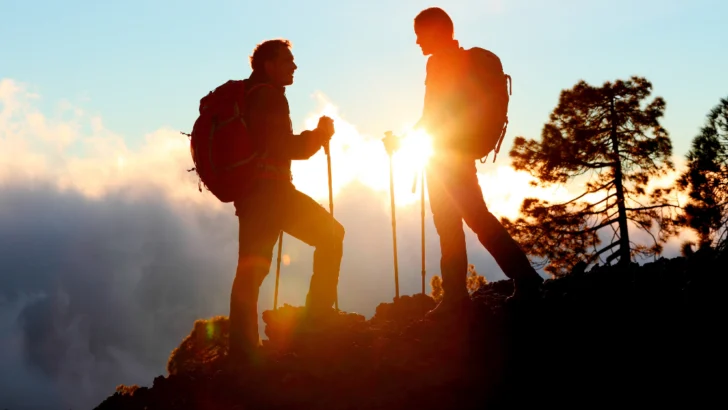Hiking is an enjoyable outdoor activity that can have a positive impact on both physical and mental health. As someone who enjoys hiking, I can personally attest to the benefits it has on my mental well-being. Research has also shown that hiking can help reduce symptoms of anxiety and depression, improve mood, and increase overall feelings of happiness and well-being.
One of the main ways hiking helps mental health is by providing an opportunity to disconnect from the stresses of daily life and connect with nature. Spending time in nature has been shown to have a calming effect on the mind and reduce feelings of stress and anxiety. Hiking also provides a chance to engage in physical activity, which has been linked to improved mental health outcomes.

If you’re looking to improve your mental health through hiking, it’s important to choose a trail that is suitable for your skill level and interests. Additionally, it’s important to properly prepare for your hike by bringing appropriate gear, staying hydrated, and being aware of your surroundings. By taking these steps, you can enjoy the mental health benefits of hiking while also staying safe and comfortable on the trail.
Key Takeaways
- Hiking can have a positive impact on mental health by reducing symptoms of anxiety and depression and improving overall mood and well-being.
- Spending time in nature and engaging in physical activity are two ways hiking can benefit mental health.
- Choosing a suitable trail and properly preparing for your hike are important steps to take when looking to improve mental health through hiking.
How Hiking Boosts Mental Health
I have found that hiking is an excellent way to improve my mental health. Hiking provides a peaceful and calming environment that allows me to clear my mind and focus on the present moment. Here are a few ways that hiking has helped me improve my mental health:
- Reduces stress and anxiety: Hiking provides an escape from the hustle and bustle of everyday life. The natural environment and fresh air help to reduce stress and anxiety, and physical activity release endorphins that boost mood and energy levels.
- Boosts self-esteem and confidence: Hiking provides a sense of accomplishment and boosts self-esteem and confidence. The physical challenge of hiking and the beautiful views at the end of a hike is rewarding and motivating.
- Improves cognitive function: Hiking has been shown to improve cognitive function, including memory, attention, and creativity. The natural environment and physical activity stimulate the brain and promote mental clarity and focus.
- Encourages social connections: Hiking with friends or in a group is a great way to build social connections and strengthen relationships. Hiking provides an opportunity for meaningful conversations and shared experiences.

Overall, hiking is a great way to improve mental health and well-being. It provides a peaceful and calming environment, boosts self-esteem and confidence, improves cognitive function, and encourages social connections.
Related Posts:
The Benefits of Hiking for Mental Health
Hiking is a great way to improve your mental health and well-being. Here are some of the ways that hiking can benefit your mental health:
Reduces Stress and Anxiety
Hiking is a great way to reduce stress and anxiety. Being out in nature can help you feel more relaxed and calm. In addition, hiking can help you get some exercise, which can also help to reduce stress and anxiety.
Improves Mood
Hiking can also help to improve your mood. Being out in nature and getting some exercise can help to release endorphins, which are natural mood boosters. In addition, hiking can help you to feel a sense of accomplishment, which can also improve your mood.

Increases Self-Esteem
Hiking can also help to increase your self-esteem. When you hike, you are setting goals and achieving them, which can help you to feel more confident in yourself and your abilities.
Reduces Symptoms of Depression
Hiking can also help to reduce symptoms of depression. Being out in nature and getting some exercise can help to improve your mood and reduce feelings of sadness and hopelessness.
Improves Sleep
Hiking can also help to improve your sleep. Getting some exercise during the day can help you to feel more tired at night, which can help you to fall asleep more easily and sleep more soundly.
Related Posts:
How Hiking Works to Improve Mental Health
When it comes to improving mental health, hiking is a great option. Here are some reasons why:
Increased Physical Activity
Hiking is a form of physical activity that can help improve mental health. Exercise releases endorphins, which can improve mood and reduce stress. Hiking is a low-impact activity that can be done at different levels of intensity, making it accessible to people of different fitness levels. By hiking regularly, individuals can improve their physical fitness and overall health, which can lead to improved mental health.
Exposure to Nature
Hiking provides an opportunity to spend time in nature, which has been shown to have numerous benefits for mental health. Exposure to nature has been linked to reduced stress, improved mood, and increased feelings of well-being. Spending time in nature can also help individuals disconnect from technology and other stressors, providing a mental break that can lead to improved mental health.

Increased Social Interaction
Hiking can also provide opportunities for social interaction, which is important for mental health. Joining a hiking group or hiking with friends can provide opportunities to connect with others and build relationships. Social support has been shown to be important for mental health and can help individuals better cope with stressors and challenges.
A Sense of Accomplishment
Hiking can provide a sense of accomplishment, which can be important for mental health. Setting and achieving goals, such as hiking a certain distance or reaching a certain peak, can provide a sense of purpose and accomplishment. This can help individuals feel more confident and capable, which can lead to improved mental health.
Related Posts:
Studies That Have Shown the Benefits of Hiking for Mental Health
I have come across a number of studies that have shown the positive effects of hiking on mental health. Here are a few of them:
- A study conducted by Stanford University researchers found that walking for 90 minutes in a natural area can decrease activity in a region of the brain associated with depression. This suggests that spending time in nature can have a positive impact on mental health.
- Another study published in the American Journal of Preventive Medicine found that people who participated in outdoor activities, including hiking, had lower levels of stress and better mental health than those who didn’t.
- A study published in the International Journal of Environmental Research and Public Health found that hiking can improve mood, reduce stress, and increase overall well-being. The study also found that hiking in nature has a greater impact on mental health than hiking in urban areas.
- A review of studies published in the Journal of Environmental Psychology found that spending time in nature, including hiking, can improve attention and cognitive function, reduce symptoms of ADHD, and improve mood and self-esteem.
These studies suggest that hiking can have a positive impact on mental health. Whether it’s reducing stress, improving mood, or increasing overall well-being, spending time in nature and engaging in physical activity can be beneficial for mental health.
Tips for Choosing a Hiking Trail That is Good for Mental Health
When it comes to choosing a hiking trail that is good for mental health, there are a few things to keep in mind. As someone who enjoys hiking and has experienced the mental health benefits firsthand, I have some tips to share.
First, consider the terrain of the trail. Walking on uneven terrain, like that of hiking trails, causes the body to use more energy and engage more muscles, which can help boost mood and reduce stress. Look for trails with varying elevations and natural obstacles like rocks and tree roots.
Second, consider the scenery. Research has shown that exposure to nature can help reduce symptoms of anxiety and depression. Look for trails with scenic views, bodies of water, and diverse plant life.

Third, consider the length and difficulty of the trail. While challenging hikes can be rewarding, it’s important to choose a trail that is appropriate for your fitness level and experience. Starting with shorter and easier hikes can help build confidence and reduce the risk of injury.
Lastly, consider the time of day and weather conditions. Hiking during daylight hours and in good weather can help boost mood and reduce stress. Be sure to check the weather forecast and plan accordingly.
By keeping these tips in mind, you can choose a hiking trail that is not only good for physical health but also for mental health.
Related Posts:
How to Prepare for a Hiking Trip That is Good for Mental Health
When preparing for a hiking trip that is intended to improve mental health, there are a few things to keep in mind. Here are some tips to help make your hiking trip a success:
- Start with a plan: Before embarking on a hiking trip, it is important to have a plan in place. This includes determining the length and difficulty of the hike, as well as the location and time of day. It is also important to let someone know where you will be hiking and when you plan to return.
- Choose the right gear: The right gear can make all the difference when it comes to hiking. Comfortable shoes with good support, breathable clothing, and a backpack with enough space for essentials are all important. Sunscreen and insect repellent are also important to pack.
- Stay hydrated and fueled: It is important to stay hydrated and fueled during a hike. Bring plenty of water and snacks to keep your energy levels up.
- Be mindful and present: Hiking can be a great opportunity to practice mindfulness and being present in the moment. Take time to appreciate the scenery and focus on your breathing.
- Know your limits: It is important to know your limits when it comes to hiking. Start with shorter, easier hikes and gradually work your way up to more challenging ones.

By following these tips, you can prepare for a hiking trip that is good for your mental health.
Related Posts:
Additional Tips for Choosing a Hiking Trail That is Good for Mental Health
When it comes to choosing a hiking trail for mental health, there are a few things to keep in mind. Here are some additional tips to help you choose the best trail for you:
Choose a Trail That is Not Too Challenging
While hiking can be a great way to challenge yourself physically and mentally, it’s important to choose a trail that is not too difficult for your skill level. If you choose a trail that is too challenging, you may become overwhelmed and discouraged, which can actually have a negative impact on your mental health. Start with a trail that is easy or moderate and work your way up as you become more experienced.
Choose a Trail That is in a Beautiful Location
One of the benefits of hiking for mental health is getting out into nature and enjoying the beauty around you. When choosing a trail, look for one that is in a beautiful location, such as a forest, mountain, or near a body of water. Being surrounded by nature can help reduce stress and anxiety and improve your overall mood.

Choose a Trail That is Not Too Crowded
While it’s great to be around other hikers, choosing a trail that is too crowded can be overwhelming and stressful. Look for a trail that is less popular or try to go during off-peak times to avoid crowds. This can help you feel more relaxed and at ease during your hike.
Make Sure You Are Physically Fit Enough for the Hike
Before embarking on a hiking trail, make sure you are physically fit enough for the hike. This includes having the stamina and strength to complete the hike without feeling exhausted or overwhelmed. If you’re not sure if you’re physically fit enough for a particular trail, start with an easier trail and work your way up.
Bring Plenty of Water and Snacks
Staying hydrated and fueled during your hike is important for both your physical and mental health. Bring plenty of water and snacks to keep your energy levels up and prevent dehydration.

Wear Comfortable Shoes and Clothing
Wearing comfortable shoes and clothing can make a big difference in your overall hiking experience. Choose shoes that provide good support and fit well, and wear clothing that is appropriate for the weather and allows you to move freely.
Let Someone Know Where You Are Going and When You Expect to Be Back
Finally, always let someone know where you are going and when you expect to be back. This is important for safety reasons and can also give you peace of mind knowing that someone knows where you are in case of an emergency.
Conclusion
In my experience, hiking has been an incredibly effective way to improve my mental health. The benefits of spending time in nature are supported by research, which shows that hiking can help to reduce symptoms of depression and anxiety, boost mood, and improve overall well-being.
One of the key benefits of hiking is the opportunity to disconnect from the stresses of daily life. Being in nature can help to reduce feelings of overwhelm and provide a sense of calm and relaxation. Additionally, hiking can be a great way to get exercise, which has been shown to have numerous mental health benefits.

Another benefit of hiking is the opportunity to challenge oneself and build confidence. Whether it’s tackling a difficult trail or pushing oneself to go farther than before, hiking can help to build resilience and a sense of accomplishment.
Overall, I believe that hiking is an excellent way to support mental health. Of course, it’s important to remember that hiking is not a substitute for professional mental health care. However, for those looking for a way to improve their well-being, spending time in nature and getting exercise through hiking can be a great place to start.
Frequently Asked Questions
What are some physical benefits of hiking?
Hiking is a great form of exercise that can provide numerous physical benefits. It can help improve cardiovascular health, increase muscle strength and endurance, and promote weight loss. Additionally, hiking can improve balance and coordination, which can reduce the risk of falls and injuries.
Can hiking help with symptoms of depression?
Yes, hiking can be an effective way to improve symptoms of depression. Spending time in nature and engaging in physical activity can help reduce stress, improve mood, and increase feelings of well-being. Additionally, hiking can provide a sense of accomplishment and purpose, which can be beneficial for those struggling with depression.
What are some spiritual benefits of hiking?
Hiking can provide a sense of connection to something greater than oneself, which can be beneficial for spiritual well-being. It can also provide a sense of peace and tranquility, which can be helpful for those seeking spiritual renewal or reflection.
How does spending time in nature affect mental health?
Spending time in nature has been shown to have numerous mental health benefits. It can help reduce stress, improve mood, increase feelings of well-being, and promote relaxation. Additionally, exposure to nature has been linked to improved cognitive function and attention, as well as reduced symptoms of anxiety and depression.
What are some social benefits of hiking?
Hiking can be a social activity that provides an opportunity to connect with others and build relationships. It can also provide a sense of community and belonging, which can be beneficial for social well-being.
What scientific evidence supports the mental health benefits of hiking?
There is a growing body of scientific evidence that supports the mental health benefits of hiking. Studies have shown that spending time in nature and engaging in physical activity can improve mood, reduce stress, and increase feelings of well-being. Additionally, exposure to nature has been linked to improved cognitive function and attention, as well as reduced symptoms of anxiety and depression.
